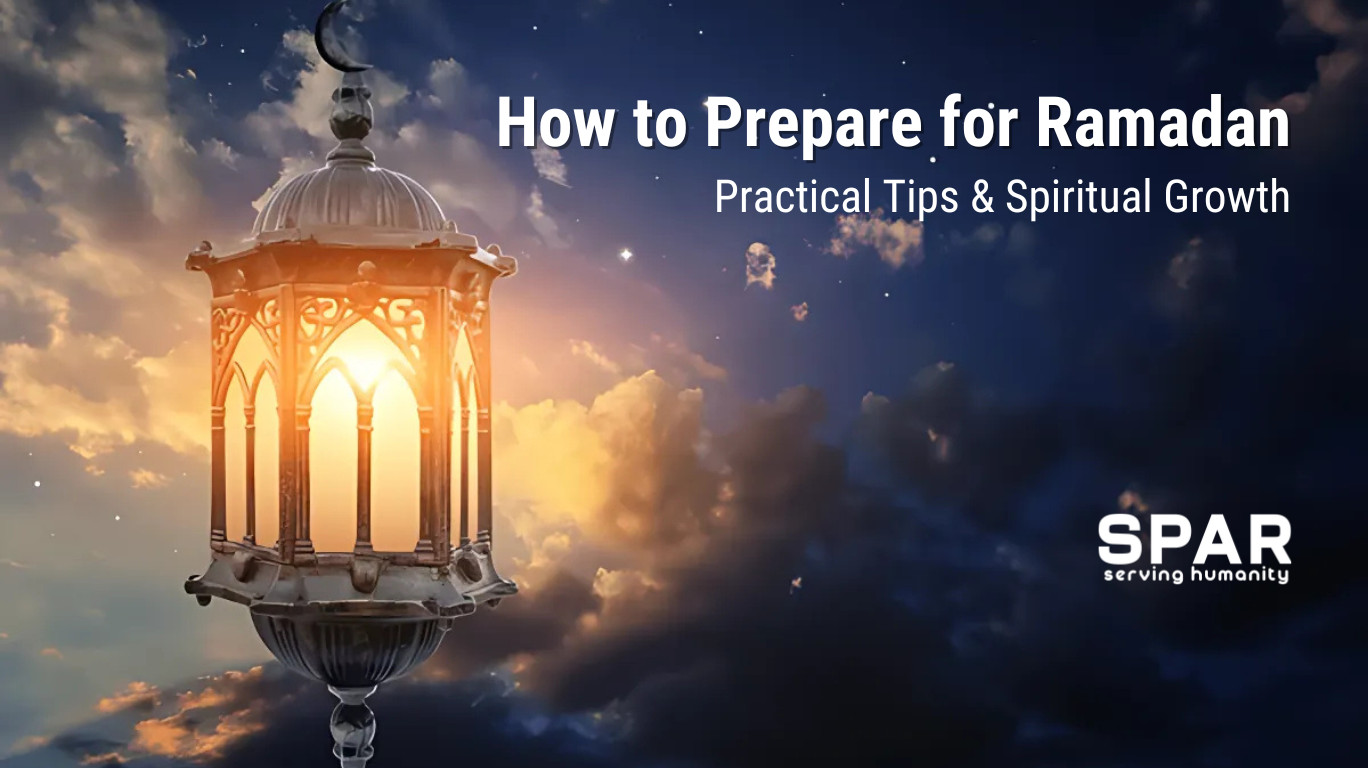How to Prepare for Ramadan: A Step-by-Step Guide
Ramadan is regarded as the holiest month in the Islamic calendar, where one grows spiritually and reflects through abstinence. As such, preparing well for this period can ensure you receive to the fullest this month’s blessings. In this post, we will be looking at How to prepare for ramadan while improving both your spiritual and physical preparedness. This article gets you started on the best preparations, ranging from setting your intentions and meal planning to organizing your daily routine.
1. Know the Significance of Ramadan
Ramadan is the holy month when the Quran was revealed to Prophet Muhammad (peace be upon him). It is one of the Five Pillars of Islam, which places great importance on self-discipline, compassion, and spiritual reflection.
Fasting in Ramadan is not only about withholding oneself from eating and drinking; it is spiritual rejuvenation by developing self-restraint and showing empathy towards all those who struggle to get by. Understanding such principles will help approach Ramadan with an appropriate mindset of mind, body, and spirit.
2. Set clear intentions (Niyyah)
Begin your Ramadan with good intentions. Think about what spiritual goals you would like to achieve, such as coming closer to Allah (SWT) and being kind to others. You can always write down your intentions to remind yourself of what you want to achieve this month.
Some common intentions:
- To offer all the prayers on time.
- To read more Islamic books or attend online lectures about Islam.
- To refrain from gossip and negative talking.
- To be more close to your family and community.
3. Empower Your Faith
- Try to spend some part of every day reading and learning about the Quran. Finish a little every day to complete it during this month.
- Learn the Sunnah and Hadith relevant to Ramadan that are practiced during Ramadan to have more knowledge regarding this month.
- Strive to bring excellence into the quality of your Salah. Avail this time to enhance your recitation and create much better connectivity with Allah SWT.
- Attend Taraweeh prayers and listen to the Quran being recited from beginning to end.
4. Plan Your Day-to-Day
It’s hard to balance worship, work, and sleeping. Design a daily schedule that includes time for:
- Suhoor (pre-dawn meal) and Iftar: Give yourself plenty of time for meals, so you do not rush your eating.
- Quran recitation with reflection: Allow specific times for reading and reflecting upon the meanings.
- Prayers, including Taraweeh: Allow yourself good reminders so you don’t miss any Salah.
- Time to rest and leisure: sleeping and leisure time keeps your energy level.
A planned schedule will help you in spending each day fruitfully while keeping you organized and focused.

5. Get Your Body Ready for Fasting
Fasting for extended periods of time is not easy, and it can be hard on your body. To get into the groove:
- Cut down snacking and caffeine gradually so you don’t face withdrawal symptoms.
- At least 8 glasses of water daily to keep the body hydrated. Hydration prevents fatigue and headaches during fasting.
- Nutrient-dense meals, plenty of fruits, vegetables, and proteins. Incorporate complex carbohydrate-rich food for sustained energy.
- Start intermittent fasting a week in advance from Ramadan to help your system get used to it.
6. Organize Your Home
A neat and tranquil environment really polishes your focus this Ramadan:
- Declutter: Clear everything not needed and make a serene space to worship.
- Prayer Area: Create a prayer area with a mat, Holy Quran, and tasbeeh.
- Ramadan Decorations: Infuse the air with the spirit of Ramadan with lanterns and banners that will elevate your spirit to welcome Ramadan with fervor.
Organizing the home makes it easier to worship but also pushes the family members to be more active in worshipping.
7. Plan Wholesome Meals
The secret to maintaining energy levels is healthy meals.
- Suhoor: should be made with foods that are not quickly digested, like oats, eggs, and yogurt. These would keep the stomach full for longer and give more energy.
- Iftar: After having dates and water, if Sunnah, followed by a balanced meal comprising lean proteins, whole grains, and lots of vegetables.
- Avoid: Fried and sugary food since it causes fatigue and bloating.
A great way to save time is to consider meal planning for the week and avoiding last-minute stress. Also, batching and freezing meals in advance can be a lifesaver during busy days.
8. Practice Charity
Charity is one of the cornerstones of Ramadan. Prepare for Ramadan by:
- Giving: Setting apart a part of your earnings for Zakat and Sadaqah.
- Volunteering: Participating in any local community service activities, such as distributing food or helping in a shelter.
- Helping Your Neighbors: Assist neighbors who might be elderly or less fortunate during Ramadan.
Not only will it complete an essential part of Ramadan, but it also gives a great feeling of spiritual satisfaction.
9. Involve Your Family
Make Ramadan a time for family bonding:
- Teach Children: Share stories about the significance of Ramadan and encourage them to fast for short periods.
- Family Prayers: Encourage collective prayers and Quran recitation sessions.
- Shared Activities: Engage everyone in preparing Suhoor and Iftar or decorating the house for Ramadan.
Having a supportive family atmosphere will make Ramadan much easier and more enjoyable for all.
10. Prepare Mentally and Emotionally
Ramadan is not only a physical but also a mental and emotional journey.
- Reflect on your goals and past experiences to identify areas for improvement.
- Practice patience and gratitude in daily life, even outside fasting hours.
- Limit distractions like excessive screen time or social media to focus on worship and self-reflection.
Mental clarity and emotional stability will help you stay committed to your spiritual goals throughout Ramadan.
11. Learn Dua and Dhikr
Dua and Dhikr are potent arms for spiritual growth:
- Memorise and recite important Duas, especially those related to Ramadan.
- Engage in the remembrance of Allah throughout your day by way of Dhikr.
- Take out time after every prayer for personal supplication for the forgiveness of sins, guidance, and blessings.
12. Seek Forgiveness
Ramadan is a chance to cleanse your heart and seek forgiveness.
- Reflect upon your past wrongs and sins.
- Make sincere Tawbah (repentance) and beg for Allah’s mercy.
- Forgive others and fix the relationships in order to heal your soul.
Final Thoughts: How to prepare for Ramadan
How to get ready for Ramadan goes beyond the physical preparation; it is an accumulation of spiritual, mental, and emotional ways. By planning ahead and embracing the true essence of Ramadan, you are in for a rewarding and fulfilling experience. May this month be one of growth, gratitude, and spiritual renewal.
When should I start preparing for Ramadan?
Start at least a few weeks in advance to set your routine gradually.
What are some healthy Suhoor meal options?
Opt for slow-digesting foods such as oatmeal, fruits, and proteins to sustain energy.
How can children participate in Ramadan?
Explain to them the importance of it, involve them in decorating, and encourage them to fast for short periods.
Can I stay active while fasting?
Yes, light exercises after Iftar or before Suhoor can maintain fitness.
Which foods should be avoided during the month of Ramadan?
Avoid processed food, fried food, and beverages containing sugar, as they make people’s bodies get tired.
How does one stay productive during fasting?
Delegate tasks, take breaks in between, and allocate time to spirituality.
How can spiritual connection be drawn out during Ramzan?
More Quran recitation, heartfelt prayers performed with feelings, and self-reflection on a daily basis.
What is the significance of giving Zakat in Ramadan?
Paying Zakat cleans your money and helps someone in need, which is the significant pillar of Islam.




 Secure
donation
Secure
donation